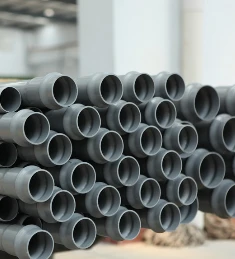Dec . 11, 2024 09:22 Back to list
Durable and Lightweight CPVC Panels for Various Construction Applications
Understanding CPVC Panels A Comprehensive Overview
CPVC, or Chlorinated Polyvinyl Chloride, has gained significant traction in recent years as a versatile material widely used in various construction and manufacturing applications. CPVC panels, in particular, are becoming a popular choice in building and renovation projects due to their unique properties and advantages. This article will delve into what CPVC panels are, their benefits, applications, and some considerations to keep in mind when using them.
What are CPVC Panels?
CPVC panels are sheets made from a type of plastic known for its chemical resistance and durability. Chlorinated through a special process, CPVC exhibits enhanced properties compared to its unchlorinated counterpart, PVC. These panels can be used as wall coverings, partitions, and even ceilings, making them an attractive option for various interior applications. Future innovations and formulations in CPVC technology continue to broaden the scope of its potential uses.
Key Benefits of CPVC Panels
1. Chemical Resistance One of the standout characteristics of CPVC panels is their exceptional resistance to a wide variety of chemicals. They can withstand harsh environments and exposure to corrosive substances without deterioration. This makes them particularly suitable for laboratories, chemical plants, and facilities dealing with hazardous materials.
2. Flame Retardant CPVC exhibits inherent flame-retardant properties. In the event of a fire, it does not produce toxic gases and burns at a slower rate compared to other plastic materials. This property not only enhances safety but also makes CPVC panels compliant with fire safety regulations.
3. Ease of Installation These panels are lightweight and easy to handle, which makes installation tasks considerably simpler. They can be cut, drilled, or shaped easily, and they require minimal tools for assembly, reducing labor costs and installation time.
4. Low Maintenance Unlike traditional materials such as wood or metal, CPVC panels require far less maintenance. They do not rot, corrode, or rust, ensuring that they maintain their appearance and functionality over time. A simple periodic cleaning is often all that's necessary to keep them looking new.
5. Aesthetic Flexibility CPVC panels come in various colors, finishes, and textures, allowing architects and designers to choose options that best fit their aesthetic vision. Whether for a modern commercial space or a clinical environment, there is likely a CPVC panel suitable to meet design needs.
6. Cost-Effectiveness While the initial costs may be higher compared to some traditional materials, the long-term durability and low maintenance requirements of CPVC panels often lead to overall cost savings. Their longevity reduces the need for replacements and repairs.
Applications of CPVC Panels
cpvc panel

CPVC panels are versatile and find utility in various settings, including
- Commercial Buildings Offices and retail spaces benefit from their durability and aesthetic appeal. - Industrial Facilities Their chemical resistance makes them ideal for manufacturing plants, warehouses, and laboratories.
- Healthcare Settings Hospitals and clinics utilize CPVC panels due to their cleanliness and ease of sterilization.
- Food Processing Plants CPVC is safe for use in environments where cleanliness and contamination control are critical.
Considerations When Using CPVC Panels
While CPVC panels offer numerous advantages, there are also factors to consider
- Thermal Expansion Because CPVC is a type of plastic, it can expand and contract with temperature fluctuations. Adequate spacing and planning during installation can help mitigate this issue.
- Compatibility with Other Materials CPVC might not bond well with certain adhesives or sealants. It's essential to confirm compatibility to avoid future maintenance issues.
- Environmental Impact Like all plastics, CPVC production and disposal can have environmental considerations. Users should be informed about recycling options available in their regions.
Conclusion
In summary, CPVC panels are a forward-thinking solution for modern construction and design needs. Their unique properties such as chemical resistance, flame retardancy, low maintenance, and aesthetic versatility make them highly suitable for various applications across multiple industries. As technology and construction practices evolve, embracing materials like CPVC can lead to safer, more efficient, and more sustainable buildings. Understanding and utilizing CPVC panels effectively can greatly enhance project outcomes, benefiting both builders and users alike.
-
HDPE Natural Sheet: Durable, Food-Grade & Versatile Plastic Solutions
NewsAug.27,2025
-
Durable Glossy PVC Rigid Sheet | Premium High-Shine Panels
NewsAug.26,2025
-
Durable PP Rigid Sheet: Lightweight, Chemical Resistant Solutions
NewsAug.21,2025
-
PVC Grey Sheet for Extraction: Chemical Resistant & Durable
NewsAug.19,2025
-
Durable PVC Pipe Fittings for Plumbing & Irrigation Needs
NewsAug.18,2025
-
HDPE Steel Belt Reinforced Spiral Corrugated Pipe | High Strength
NewsAug.17,2025

